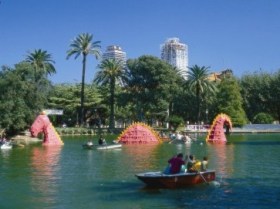Valencia: Spain’s third largest city is enjoying a real renaissance. A new state-of-the-art zoo, the $94 million Bioparc Valencia, recently opened here. At the 25-acre park – home to 4000 animals from 250 species – visitors can watch antelope and zebras gallop over the African savannah and gorillas and leopards roam through lush equatorial forest. (Bioparc Valencia or www.bioparcvalencia.es)
The City of Arts and Science, a stunning “city of the future,” contains a dramatic 60-foot-high entranceway with 55 arches, an aquarium, planetarium, science museum and a performing arts center. Europe’s largest marine park, the Oceanographic, is a series of parabolic buildings – virtually an underwate r city – providing a hi-tech tour of the world’s marine habitats. The vast roof of the Prince Felipe Museum of Science resembles a dinosaur’s spine and the 130-foot transparent north façade allows plenty of natural light to enter this kid-friendly place full of holograms, lasers and interactive displays. The Hemispheric, a state-of-the-art planetarium has an IMAX theatre currently screening “The Alps, “Coral Reefs,” and “Mysteries of the Nile.” A combined ticket for up to three days is around $36 for seniors and children (4-12 years old). Children under 4 years old are free. (City of Arts and Science or www.cac.es)
r city – providing a hi-tech tour of the world’s marine habitats. The vast roof of the Prince Felipe Museum of Science resembles a dinosaur’s spine and the 130-foot transparent north façade allows plenty of natural light to enter this kid-friendly place full of holograms, lasers and interactive displays. The Hemispheric, a state-of-the-art planetarium has an IMAX theatre currently screening “The Alps, “Coral Reefs,” and “Mysteries of the Nile.” A combined ticket for up to three days is around $36 for seniors and children (4-12 years old). Children under 4 years old are free. (City of Arts and Science or www.cac.es)
The city’s waterfront was completely renovated for last year’s America’s Cup and the magnificent sea-front promenade, the Paseo Maritimo, is ideal for walking, jogging or roller skating. The beaches of Las Arenas and Malvarrosa have areas designated for children, volleyball and kite flying. (Visit Valencia at www.turisvalencia.es)
Madrid: The Spanish capital is a lovely city of wide boulevards and huge plazas. Offering a cool respite from the warm summer temperatures, Retiro Park is where Madrileños go to paddle around the lake or ride in horse-drawn carriages, while children will be entranced by the animated street performers, puppeteers and story tellers. A few minutes from the Retiro are the city’s three major museums – Museo del Prado, the Reina Sofía and the Thyssen Bornemisza – which have all doubled in size in the past four years. While you might not want to spend hours, it’s easy to select a few special things to entertain small children, like one of Picasso’s inimitable paintings. Tip: the Prado is free Tuesdays through Saturdays from 6 to 8 PM and Sundays from 5 to 8 PM. Seniors and children younger than 18 enter free of charge any time.
Everyone – especially children – likes animals. Two baby pandas arrived at the Madrid Zoo and Aquarium last September and have been drawing crowds ever since. About an hour out of the city, the Safari Park at Aldea del Fresno has elephants, rhinos, hippo and giraffe while the Cuenca Alta del Manzanares in La Pedriza offers guided tours for children on weekends where they can get up close and personal with some of Spain ’s indigenous animals like: roe deer, griffin vultures and otters. And when the summer temperatures creep up in the 80’s, kids will definitely want to check out Madrid SnowZone. Here, kids can slalom – or tube – down the 800-foot slope and frolic in the snow. (Madrid SnowZone http://madridsnowzone.com/index.php)
Local transportation can be expensive anywhere in Europe, but Madrid’s metro is only about $2 to $3 a trip and a one-day metro and bus pass is only about $6.30 (about $3.15 for kids and under 4 go free). There’s also the Madrid tourist bus, which has two routes and you can hop on and hop off the bus unlimited times over one or two days. Children under 7 are free; ages 7 to 16 pay $13.35 for one day ($17.30 for 2 days); and adults pay about $25.15 for one day ($32 for two days.) (Tourist Bus at www.turismomadrid.es)
Barcelona: The city of Gaudí  offers phantasmagorical structures to amaze travelers of any age. Designed by the Modernist artist in the late 1890s, and now designated a World Heritage Site by UNESCO, the artist’s Parc Güell contains the Room of a Hundred Columns with 84 crooked pillars covered with glass and ceramic mosaics and the Gran Placa Circular, with its balcony of colored mosaics and an undulating bench, said to be the world’s longest. Entrance is free.
offers phantasmagorical structures to amaze travelers of any age. Designed by the Modernist artist in the late 1890s, and now designated a World Heritage Site by UNESCO, the artist’s Parc Güell contains the Room of a Hundred Columns with 84 crooked pillars covered with glass and ceramic mosaics and the Gran Placa Circular, with its balcony of colored mosaics and an undulating bench, said to be the world’s longest. Entrance is free.
Nestled into the side of Barcelona’s famous Montjuïc mountain, Poble Espanyol, or Spanish Village, is the city’s fourth most popular tourist attraction. This 12-acre open-air museum has architecture from all around Spain including Andalusia, Catalonia and Aragon . In the Children’s Village, some 40 craft workshops will engage teenagers and adults while special kid’s shows, games and story-telling sessions will amuse youngsters. (Poble Espanyol at www.poble-espanyol.com)
The second of Barcelona’s famous hilltops, Tibidabo is reached by the Tramvia Blau, (Blue Trolley), the city’s last remaining trolley. Besides traditional amusement park rides including a carousel, there’s a four dimensional cinema, the Robot Musuem, Marionetàrium puppet center and the Krüeger Horror Hotel – all sure to excite young ones. Tip: If you use public transportation, your fare will be reimbursed at the ticket office. (Tibidabo Hilltop at www.tibidabo.es/default_eng.asp)
Barcelona’s Zoo, the Botanical Gardens and the Aquarium all have reduced rates for seniors and children. Beaches such as Barceloneta near the Olympic port are easily accessible and patrolled by lifeguards and the Maritime Beach has a children’s playground. The Barcelona Tourist Bus is a good deal. A two-day pass with unlimited stops is free for kids under 7 and costs $31.80 for adults and $17 for ages 7 to 16. (Barcelona at www.bcn.es/english/ihome.htm)
Make it happen. For information about renting villas or apartments in Spain contact the Tourist Office of Spain in New York (212-265-8822); Miami (305-358-1992); Chicago (312-642-1992) or Los Angeles (323-658-7195) or www.spaininfo.com
Content and images provided by Spain's Office of Tourism. Copyright updated 2014.